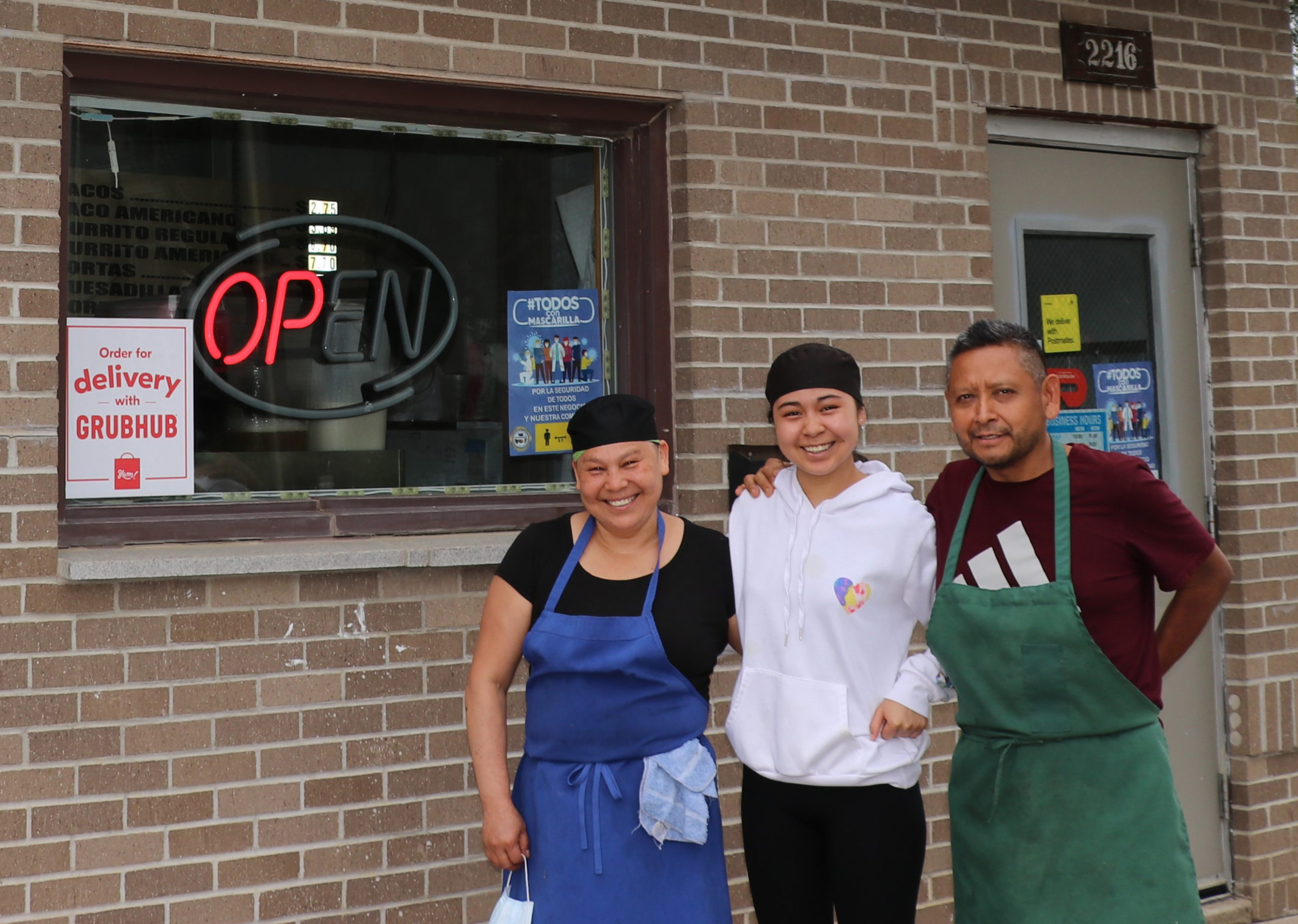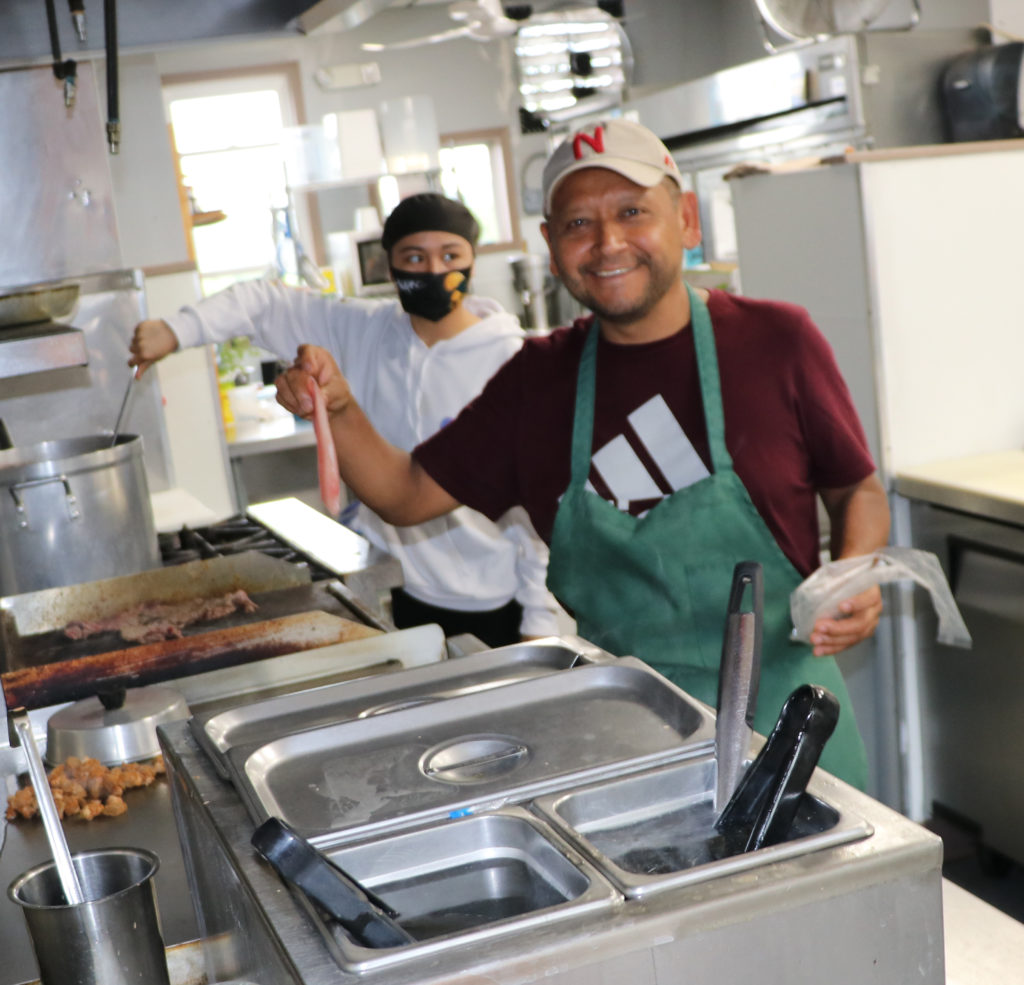
Eusebia Bustamante, left, Mitci Castro and Celestino Bustamante stand outside Tixteco, the restaurant owned and operated by the Bustamantes in South Omaha. ELIZABETH WELLS
News
Microbusiness program helps dreams become reality
July 9, 2020
Through 26 years of marriage, raising a family, enduring job losses and relocating from Chicago to Omaha, Eusebia Bustamante and her husband Celestino Bustamante always had a dream.
That dream was to own their own restaurant. And it finally became a reality two years ago.
But the transformation from fervent hope to fledgling enterprise needed a spark, which came in 2017 with Eusebia’s completion of Microbusiness Training Program classes offered as part of Catholic Charities’ Microbusiness and Asset Development Program.
The Bustamantes now operate Tixteco, their thriving, family-owned restaurant on 16th Street, just south of Martha Street in Omaha.
When Eusebia and Celestino immigrated separately from Mexico more than 30 years ago, he said, they came with nothing – not even the language of their adopted country. They met in Chicago, and through their lives together their desire to be entrepreneurs grew.
Tixteco is named for Eusebia’s father, and the recipes are from her family’s table, she said through an interpreter. “I always had a passion for cooking, but it was in other people’s kitchens. I wanted to share my family’s recipes. Now I enjoy seeing others enjoying them. We could not have done this without the program’s help.”
JESUS’ HANDS AND FEET
Theresa Swoboda, vice president of program services for Catholic Charities of the Omaha archdiocese, said the microbusiness program fits perfectly with their mission “to be the hands and feet of Jesus Christ to spread mercy – specifically the poverty piece” and their commitment to bring about social justice.
“The microbusiness program reduces poverty, helps people become independent, creates jobs and stimulates the economy,” she said. “Another beautiful thing is that it helps people attain their dreams.”
The training program, offered four times a year, provides a wide range of services and educational opportunities that are designed specifically for entrepreneurs and small business owners. These include business consultation and coaching; help with business planning, marketing and branding; financial projections; legal services and assistance with licenses, insurance, taxes, accounting and permits. Annually, the program serves 650 people from across the 23 counties in the archdiocese.
“We are inspired by and work to empower our microbusiness students,” said Guadalupe Milan, director of the program, which is now over 25 years old. “We provide the tools they need to be able to put their dream into action. The classes and services we offer guide them through the process.”
Milan said the microbusiness program serves primarily low-to-moderate income individuals. Students are typically between 19 and 45 years old, but some are older, such as the Bustamantes, who are in their 50s.
Eusebia said she appreciated how the microbusiness program helped them obtain all the licenses required for their business.
“I had no idea how to do that. They showed how to do all the paperwork to make sure all legalities were in order,” she said, including creating her limited liability corporation.
OTHER ASSISTANCE
A microloan program also is available to students after they complete the training program. Graduates are eligible for up to $5,000 in loans to help with start-up expenses. Catholic Charities reports that more than $1 million in loans have gone to new small businesses in the past 10 years.
Microbusiness program participants also can rely on other services offered by Catholic Charities as they develop their businesses, said Swoboda.
“They realize that the food pantry can help them while they are getting established,” she said. “Legal services are also available and used. As an agency with a wide range of services, we are able to support them throughout the whole process.”
DEVELOPING SELF-SUFFICIENCY
In essence, Catholic Charities surrounds students while they “learn to fish,” Milan said, alluding to the popular saying about developing self-sufficiency.
“We help them be sustainable … to move beyond poverty in many cases … and we are with them while they are learning and then also creating jobs and helping others,” said Milan.
Graduates of the program have started businesses in a variety of fields including construction; lawn care; childcare; food services such as restaurants, catering and bakeries; cleaning services; retail and grocery. Milan said she knows of 10 such businesses with more than $1 million in annual revenue.
While participants come from across the archdiocese, Swoboda said the program has been particularly popular and successful in South Omaha.
Milan agreed, pointing to the thriving small businesses that form the backbone of 24th Street between Q and L streets. Many other small businesses, like the Bustamantes’ restaurant, extend into the surrounding neighborhoods and bring their community together, she said.

Celestino Bustamante prepares to cook a piece of fish in the kitchen of Tixteco, the restaurant he owns with his wife, Eusebia. Their niece Mitci Castro works in the background. ELIZABETH WELLS
Tixteco, which opened June 2, 2018, is a quiet but active partner in its neighborhood and community, Eusebia said. She and Celestino are members of St. Joseph Parish and regularly donate food to parish events, as well as to Our Lady of Guadalupe Parish in Omaha. They also help when members of the community experience significant challenges.
“I know that we need to have hope, to trust our God. Because God is with us, we never lose hope … We need to help each other,” Eusebia said. “We need to be a community that helps each other.” They have received and they also give back, she said.
“It’s so much more than money to be able to do these things,” said Celestino, saying that he believes God asks them to help and do things as a way of showing God’s love and instilling hope in others.
ANYTHING POSSIBLE
Another benefit of starting Tixteco with the help of the microbusiness program, Celestino noted, is that it’s an opportunity to show others that with God and hard work, anything is possible. The Bustamentes are now seeing Mitci Castro, a niece who lives and works with them, gain life lessons and basic business skills.
She dreams of going to college next year when she graduates from Omaha’s Central High School. Her aunt and uncle tell her that her most important job is to get a good education.
“They inspire me to keep working hard,” said Castro. “Some people may think they were too old to do something like this, but they did it. They motivate me to achieve my goals as well.”
Celestino said he is proud of his niece’s work ethic and straight A’s at school. “She sees that it is hard work, but she sees that we can do it,” he said. “And if she wants to, with God’s help, she can too. Anyone can.”